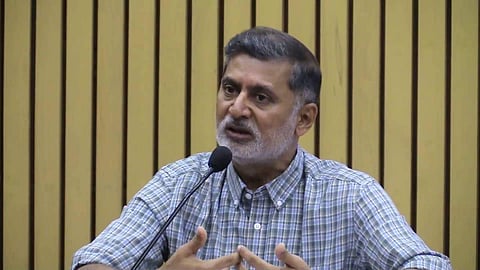

After a massive voter turnout, the Jawaharlal Nehru University Teachers Association's election results were declared on Friday, with Atul Sood from the School of Social Sciences being elected as the association's president. Soon after the announcement of the results, we caught up with Sood to seek the new association's stand on the issues going on in the university and he had a few interesting views to share.
Excerpts from the conversation:
What are a few issues that the new JNUTA is looking at right now?
We want teaching and learning to become the central focus of the universities. In the last few years, it has taken a backseat. Many of the institutional policies and structures haven't been followed now. If you want to start a new programme or change the nature of pedagogy or hold the examination, all these issues are not decided by the well-established process. Many of these proposals are coming from outside. It hasn't followed the institutional structure followed in the JNU Act. For the last three, four years, we've been raising these issues. They have to be discussed, proposed and decided by the institutional processes. To quote an example, the intake of students through online examinations hasn't been debated in the university, but it is something that has to be discussed. There are a lot of issues. In the current mode of decision making, the stakeholders are not consulted.
JNU is in the news for violence or protests. How is this affecting the university's image?
Contrary to popular belief, JNU has no history of violence. We've always stood against violence in spite of turmoil in the campus for the past four years. Even after the latest election results, there was an uprising, but the faculty was quick to intervene and conduct a peace march in order to raise consciousness among teachers and students to say that we should come together as a community. It's unfortunate that a few teachers got notices saying that they weren't following the existing discipline of the university. It was incorrect. JNU elections are quite unique in their own way. We have intense extensive debates internally. There is no issue of violence. It's unfortunate that JNU's image is spoiled. The only turmoil here is deinstitutionalisiation.
Appointment of Rajiv Malhotra as an honourary visiting faculty in JNU sparked a controversy recently. What are your comments?
It is not about individuals. We didn't know what the consultation process was behind this decision and we are unsure if the decision was internal or external. If collectively teachers feel that anyone must be brought in as a visiting faculty, that is within their mandate. But it should be representing the will of people in charge of the teaching-learning process. It shouldn't be administrative. Our issue is the way they identify people. It should be transparent, true and according to JNU's policies.
JNU student Najeeb Ahmed has been missing for more than two years now. In the light of this incident, would you call JNU a safe space for students?
Najeeb's disappearance is a serious matter. A student suddenly went missing and we have no answer about it. We've been seeking a proper inquiry. It is unfortunate and disturbing. But despite this, JNU is a very safe and vibrant place. It is the best place for teaching and learning. We are the No 1 in India. It respresents the diversity of India. Our admission policy accepts people from marginalised communities. We want the admission process to not be made unfavourable to students from marginalised groups. That is the larger issue.
